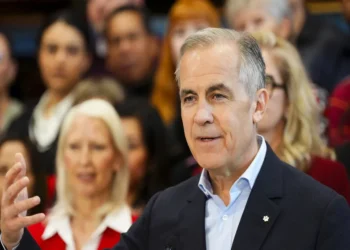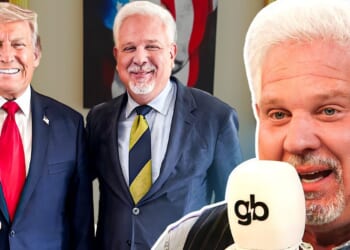If President Donald Trump’s goal was to stimulate the economy of Washington, D.C., or to maximize the number of CEOs, lobbyists, and foreign leaders who come begging for his favor, he could hardly have done better than creating a massive tariff regime.
Trump’s “reciprocal” tariffs on every country were made to be negotiated. The president can change them in an instant with a single flick of his pen.
Trump has made it clear he wants to shelter some industries from the effects of his tariffs. He has repeatedly withdrawn them whenever a foreign leader makes a move he likes — even if it’s simply symbolic. (Recall China‘s worthless pledge to buy more soy in Trump’s first term or Mexico‘s vacuous border promises earlier this year.)
Trump’s tariffs increased his leverage to extract favors from businesses, rich people, or foreign leaders.
Early signs have shown this is already happening.
Like all government interventions, tariffs create winners and losers, not just internationally but domestically.
It’s easy to assume that U.S. manufacturers win from tariffs, but that’s too simplistic because half of all U.S. imports are intermediate goods, such as the aluminum Ford uses to make the F-150.
It’s also easy to assume that all foreign manufacturers who sell to the United States are losers, but that ignores another fact: Some companies are more able than their competitors to shift their manufacturing to the U.S.
Take the case of one sister company of Chrysler: Daimler Truck North America.
Daimler makes trucks in Mexico, which it then exports to the U.S. Trump tariffs will obviously affect the company negatively. Daimler’s export profits could suffer because its U.S. customers will have to pay a tariff. Alternatively, Daimler could move some of its manufacturing to the U.S., something tariff supporters desire.
Moving its truckmaking here would increase Daimler’s costs, which sounds bad for Daimler. However, Daimler’s competitors also make their trucks in Mexico, meaning both companies face the same tariffs.
This would provide an advantage to whichever company can most economically move its manufacturing into the U.S. Daimler believes it’s them.
CEO Karin Radstrom said, “The company can move production relatively easily and that all of its Freightliner, Western Star, and Thomas Built Buses models can be made at either its U.S. or Mexican plants,” according to one trucking industry magazine.
This illustrates how subtle details about tariffs, which will inevitably be hashed out behind closed doors, can determine who wins and who loses. However, here’s another interesting detail in Daimler’s efforts to adjust to Trump’s tariffs: On Feb. 1, Daimler hired a new lobbying firm called Ballard Partners, according to a federal filing.
Ballard Partners is the most Trump-connected lobbying firm in Washington, D.C. It is run by top Trump fundraiser Brian Ballard, and its recent alumni include White House chief of staff Susie Wiles and Attorney General Pam Bondi. Ballard is registered to lobby for Daimler, as is Hunter Morgen, a top trade adviser from Trump’s first term.
By imposing tariffs and threatening to increase them, Trump has forced major corporations to hire his friends, who are also his fundraisers.
The Daimler-Ballard partnership is just one example. The data show a real tariff lobbying boom.
In the first quarter of 2025, 162 new lobbying registrations were filed that listed trade or tariffs among their concerns. That’s more than twice as much as last year and a 48% increase over former President Joe Biden’s first year.
(This year’s first quarter number — 162 new trade-related lobbying filings — is still growing, as firms have 45 days to file a registration, and the first quarter just ended March 31.)
Some of these companies are lobbying for higher tariffs, others for tariff elimination, and most for narrow waivers.
Foreign leaders will also have to lobby Trump. What could he extract from them? Perhaps he’ll ask for something valuable to the U.S., such as more defense spending by our NATO partners or scrapping their own trade distortions. However, it’s likely some foreign dignitaries will come offering some far narrower benefit, such as soy purchases, or to help some Trump property that’s facing problems.
Then there are the folks hurt by trade wars who are looking for subsidies, starting with the farmers.
U.S. tariffs trigger foreign tariffs on U.S. goods, which primarily harms American farmers. In his first term, Trump compensated them with $30 billion in relief (on top of all the normal farm subsidies.)
THE LOCKDOWNS WERE A DEADLY MISTAKE
Trump is considering a repeat of such trade-war relief for farmers.
Raising taxes, increasing government aid, and making everything more complex might not sound like conservatism. However, it is the optimal course if your goal is to increase the president’s importance and thus incentivize the rich and powerful to come knocking on the White House’s door.















